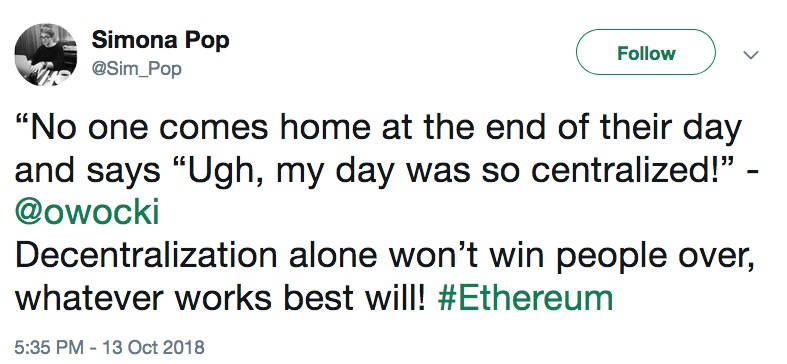In Part 1 of this post, I discussed a particular example - that of decentralised Uber to decipher if a decentralised Uber makes sense, or in general is decentralistion always better?
In this post, we will explore some the theoretical basis of the argument.
Braess's Paradox
Braess's paradox (often cited as Braess' paradox) is a proposed explanation for the situation where an alteration to a road network to improve traffic flow actually has the reverse effect and impedes traffic through it.

You can find the complete explaination of this example here. I will just suffice to say that the total commute time from Start to End is lower if there is no link from A to B vs when there is. It would be better if a rule is laid down that only a certain number of people are allowed in the road A to B. Keeping it open to independent choices of everyone produces an outcome which is sub-optimal to everyone
Decentralisation is not a value in itself
I recently came across a very interesting tweet by Simona Pop of Bounties Network.

There is no inherent value in decentralization. What decentralisation enables is of value for some people or in some contexts. Does it make people more efficient? Can theynow do things which government or regulators didn't want them to? Does it give them more control of their lives? These are the questions which actually matter.
Democracy vs Dictatorship
In context of nations, the tradeoff between democracy and dictatorship is very similar to that between decentralization and centralization.
Though nations have much broader and varied goal, compared to organizations. For example, companies have a clear metric of creating more shareholder value.
What are the metrics on which decentralised organizations should be judged? Is it the value accrued to network participants?
How much value can be assigned to network participants not getting censoured - which is one the key benefits of decentralised orgs.
Countries' metric can be GDP, GINI coefficient or the happiness level ( Bhutan actually uses this metric)
Historically, Decentralisation always emerged as a response to restrictions in centralised systems
Here's a great post which talks about the rise of decentralization in context of mp3 file sharing. The author points that decentralization always arises in response to the law when a certain use of centralized technology is denied.
A quote from the above post which sums this beautifully
Ask yourself, what can some people not do on centralized systems which they should be able to do? If you look closely, you might be able to spot informal strategies people are using today to get around the rules, and these could help inform what to formalize into a protocol.
What do people really want?
I think the key question is - What do people really want? Are they OK with sacrificing some privacy and freedom for better user experience and less effort.
If we try to reason with organization of states, most states have high level of centralization. US, China, Russia are some examples which come to mind. Direct democracies in comparison have been few and has only worked for fewer states.
Other advantage of centralization is that it concentrates power on the top layers. These people want to increase their power - leading to more alliances, subjugation or attacks - ultimately leading for the organizations to be more powerful.
Similar dynamics can be seen in corporate orgnizations. The profit motive actually helps them become bigger and concentrate more power. This drive is lacking in decentralised organizations.
Urusula Le Guinn in her book The Dispossesed portrays this beautifully. The book talks about a society born out of anarchism, an extreme form of decentralization. These people establish a society from ground up in a new planet. What was interesting was that even in this anarchist society points of centralization emerged. For example, people were given names by a centralised computer systems. Important people controlled means of production and media. The book is a great portrayal of the dichotomy between centralization and decentralization.
The emergence of miner centralization, high level of control by developers, etc. point to this phenomenon in current crypto ecosytem. It emerges primarily for better coordination and efficiency.
This begs the question:
Isn't the inherent tendency for people to strive for power a deterrent against decentralization? And what has fundamentally changed in the last few years which would tilt the balance towards decentralization?